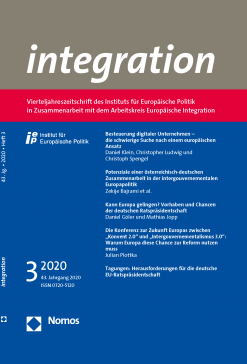Issue 3/2020 of integration

Daniel Klein, Christopher Ludwig and Christoph Spengel explain the Commission’s proposals for directives on the taxation of digital companies presented so far and describe the technical and political hurdles that are difficult to overcome on the way to a multilateral solution. In their contribution, Zekije Bajrami et al. analyze the extent to which an Austro-German tandem has the potential to build bridges between increasingly forming intergovernmental blocs within the EU, taking into account European key policy issues. In a commented reprint of their contribution from integration 1/2007, Daniel Göler and Mathias Jopp compare the context and challenges of the current German Council Presidency with those of 2007 and note that although the issues and expectations were comparable at the time, the political environment has changed considerably and the general openness for integration has declined since. In the forum section, Julian Plottka outlines three conceivable interpretations for the design of the Conference on the Future of Europe and identifies central factors that determine the success or failure of the project. Vittoria Meißner reports from the virtual edition of the German Pre-Presidency Conference organized by the Trans European Policy Studies Association and Institut für Europäische Politik on the topic of challenges for the German Council Presidency.
Taxing Digital Corporations – the Difficult Attempt to Develop a European Approach
Daniel Klein, Christopher Ludwig and Christoph Spengel
In March 2018, the European Commission introduced two Directive proposals to target tax challenges in the era of digitalization. The first Directive proposal suggests to introduce a digital services tax of 3 percent on gross revenues from digital services as an interim measure. The second one proposes as a long-term solution to extend the permanent establishment concept to create a virtual permanent establishment if a corporation has a “significant digital presence” in a country. So far, a lack of consensus among the member states of the European Union has made successful legislation on the European level unlikely. Despite the absence of an intra-community agreement, several member states have implemented the Directive proposal of a digital services tax with various adaptions unilaterally. These actions contradict the efforts to develop agreeable tax reforms on a multilateral level. The article at hand critically evaluates the current European reform proposals.
Prospects of Austrian-German Cooperation in Intergovernmental European Policy
Zekije Bajrami, Livia Puglisi, Lea Stallbaum, Michael Stellwag and Julian Plottka
In an increasingly intergovernmental European Union (EU), minilateral formations can reduce the complexity of EU decision-making. However, block formation can also complicate it. Therefore, bilateral diplomacy has to build bridges between these formations. Against this backdrop, the article examines to what extent an Austro-German cooperation can act as such a bridge between the Franco-German couple and the “frugal four”, the “Visegrád Four” and maybe in the future the Western Balkans. To this end, both the orientation of Austrian and German EU policy as well as concrete government positions on the “European Green Deal”, the multiannual financial framework, the defence union, the enlargement policy towards the Western Balkans and institutional reforms are examined. Austro-German cooperation offers opportunities for concrete initiatives on shared interests, such as the rule of law mechanism, as well as potentials for compromise in other policy areas, such as the multiannual financial framework.
The Conference on the Future of Europe: “Convention 2.0” or “Intergovernmentalism 3.0”? Why Europe Must Seize the Opportunity to Reform
Julian Plottka
Three months after the initially scheduled start of the Conference on the Future of Europe (CoFoE) its design remains unclear. While the European Parliament proposed a rather ambitious concept of a “European Convention 2.0”, the European Council seeks additional legitimacy for its Strategic Agenda, excluding the possibility of treaty reforms. However, not all national governments seem to be convinced that such an “Intergovernmentalism 3.0” legitimised by participative democracy is a good idea. In between these two positions, the European Commission seeks to water down Ursula von der Leyen’s bid to the European Parliament. Comparing the opportunities and risks entailed in these three concepts of the CoFoE, the article argues for an open process, which neither pushes for nor excludes treaty reform. If citizens and civil society support such a constitutional momentum, it is about time to address the numerous reform needs and to end the further procrastination of treaty reforms.
Directly order integration at Nomos Verlagsgesellschaft or in the bookstore.
Prices 2020:
Yearly subscription Private (print-edition incl. online access) 78,– €;
Yearly subscription for students (print-edition incl. online access) 44,– € (please send proof of enrollment);
Yearly subscription for institutions (print-edition incl. online access) 152,– €;
Single edition 22,– €. All prices include VAT, shipping comes at an additional cost (Shipping cost in Germany 13 Euro per year).
integration is supported by the Federal Foreign Office.
